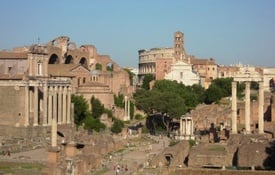Here is a very serious critique of the mainline by Walter Russell Mead, and I offer it to you for conversation. It was sent to me by a friend, an Episcopalian priest, and one who observes that too many today – and he observes that evangelicals are about a century behind the mainline in this — are following down this path.
The Blue Social Model isn’t the Kingdom of God.
My final provocative thesis is this: there’s an underlying problem that both leads mainline church leaders like Episcopal bishops to put too much weight on making vapid and useless political statements and that contributes to the inexorable decline of the churches entrusted to their charge.
The problem is that the contemporary mainline churches have confused the Blue social model with the Kingdom of God. I’ve written about this model before — what the Blue model is and why it is breaking down, why the breakdown has impaled contemporary liberal politics on the horns of an impossible dilemma, and how the Blue Beast is sucking the life out of themainline churches today. Historically this is not surprising; the blue social model was in large part formed by thinkers from the mainline churches in the late nineteenth and early twentieth centuries. Somehow the mainline churches came through the violence and the upheavals of the twentieth century with their faith in liberal progress largely intact. Neither Stalin nor Hitler nor Reinhold Niebuhr could convince us of the power of original sin; neither Hiroshima nor the Holocaust shook our faith in the ability of good government programs to remake mankind.
To mistake an ideology or a social model for the transcendent and always surprising (and irritating!) Kingdom of God is, technically speaking, the sin of idolatry. It is to worship the work of our own hands. What makes it worse is that to some degree in the mainline churches we have replaced faith in the scripturally based and historically rooted doctrines and values of the Christian heritage with faith in progressive social thought.
Instead of proclaiming a gospel of salvation that still brings lost sinners streaming through the doors (ask the Pentecostals and evangelicals who have continued to grow even as we shrink) we issue statements urging the federal government to fulfill its contributions to the Millennium Development Goals and to raise the minimum wage. They preach and plant churches; we have professional development workshops for diocesan employees.
I want to be clear here. Liberal mainline Protestantism is not just a ghastly mistake and a return to literalism and fundamentalism is not the way out of the current impasse. The great historical riches and insights of the mainline denominations are more important than ever today. The liberal, questing spirit that refuses to take ancient truths for granted and that challenges historic orthodoxies in the light of lived experience has a vital and necessary place in the life of the church. It’s important that the mainline churches halt their disintegration and decline and regain the strength to play their role in the American religious system. I am not writing all these terrible things about bishops because I want them to fail. God has work for the mainline church to do, and God’s work in the world will suffer if we fail.
But the Blue Beast cannot save American society and it cannot save the mainline church. Until we come to terms with these truths and start living them we can neither help ourselves nor do much to help anybody else.

